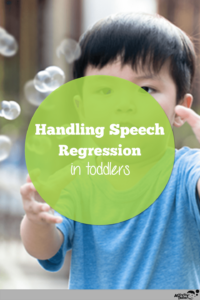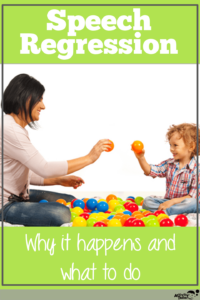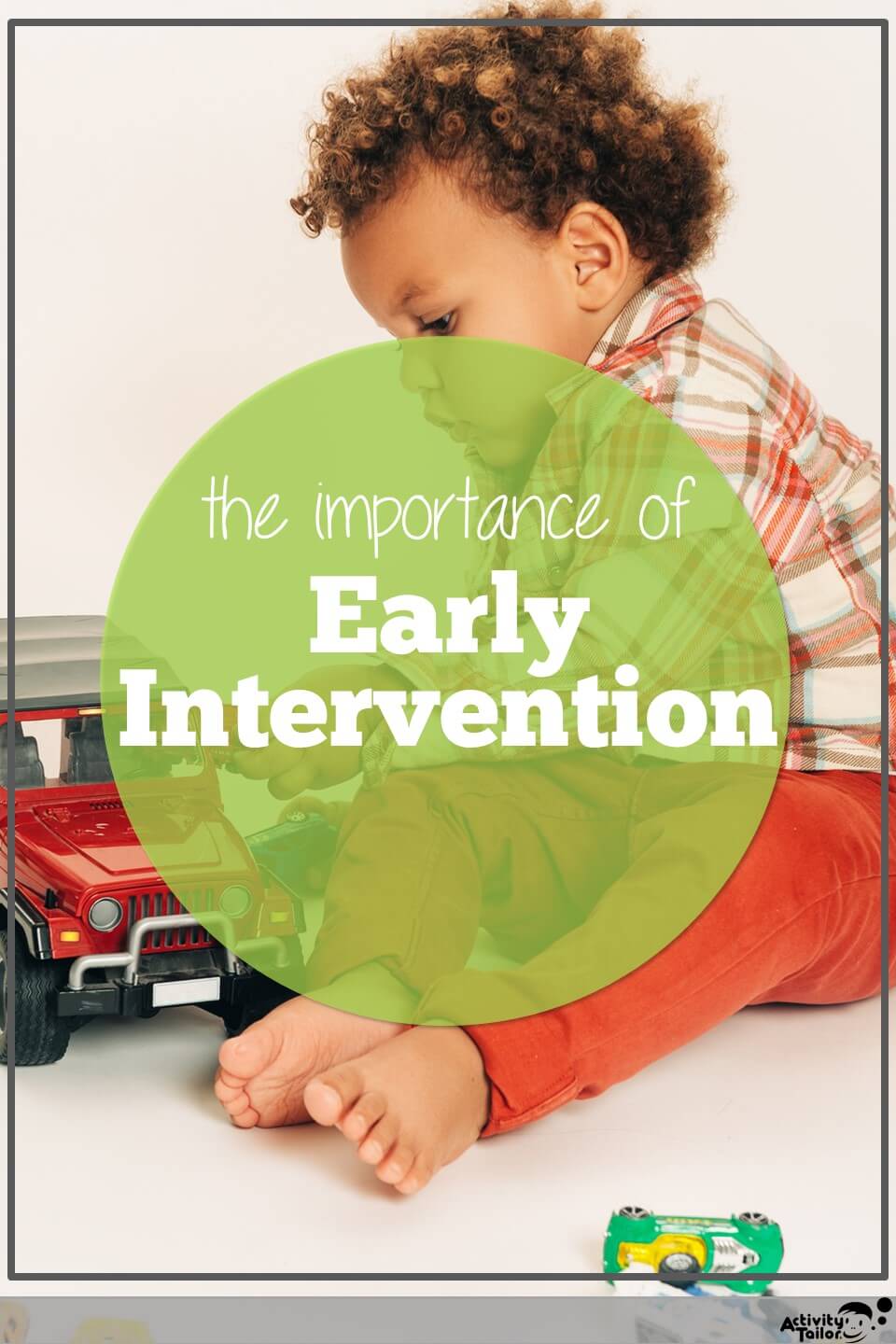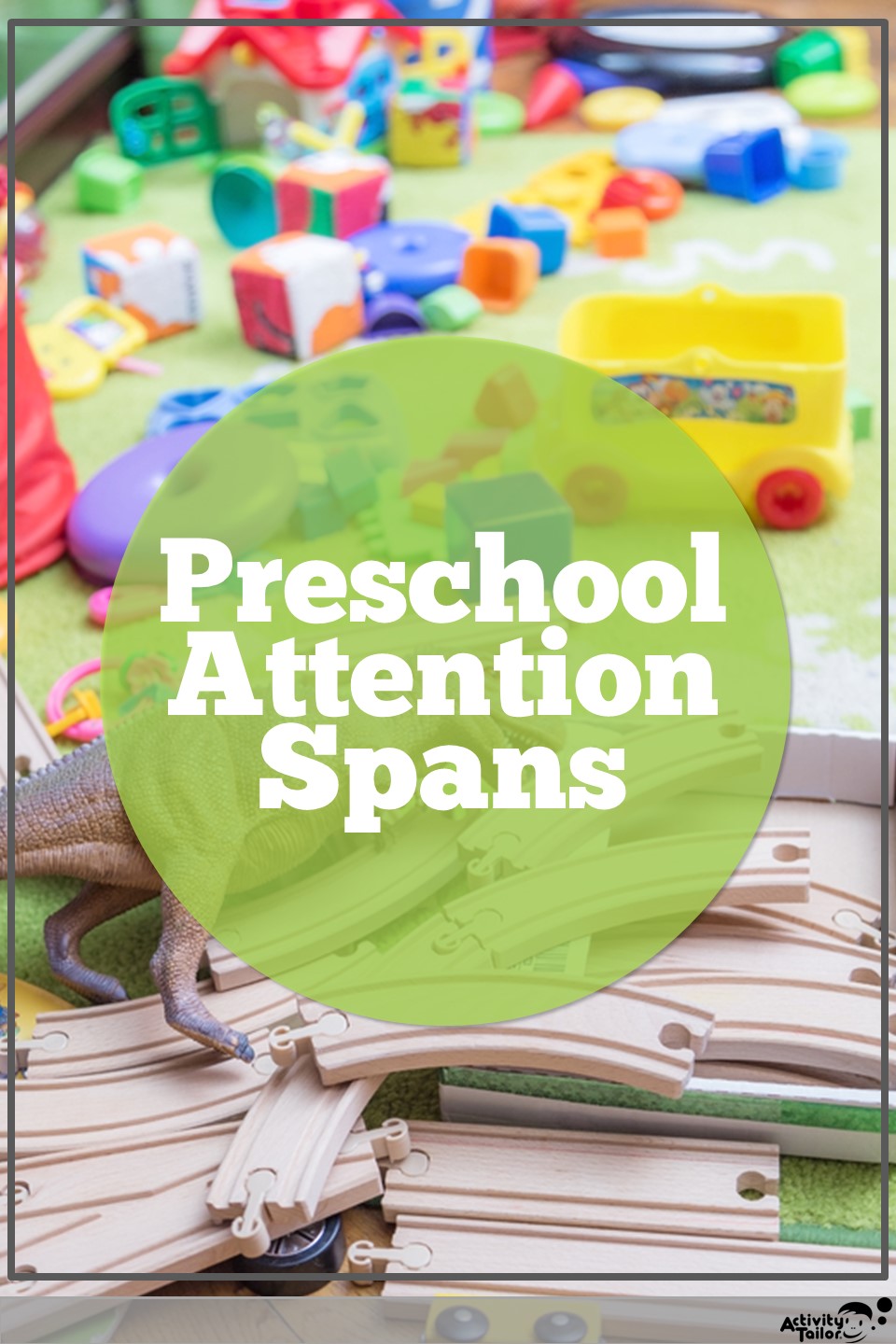Have you heard the comment, “Contact your pediatrician if you notice a regression in skills?”… Let’s talk about what speech regressions really mean, why they happen, and how to help.
What is a Speech Regression?
Regression is a decline in skills. This occurs when a child is not performing skills they once were able to.
In regards to speech and language, this might look like a toddler who:
- stops using words to make requests and now uses jargon or crying
- has a significant decrease in interaction with other children or adults and seems much more focused on solitary play
- stops saying simple words they regularly used to say and reverts back to babbling
- stops pointing to seek others’ attention and now only cries or doesn’t seek attention at all
Why Do Regressions Happen?
- Potential indicator of Autism
- Significant life change
- Mastering other milestones
Potential Indicator of Autism
A loss of skills in toddlers’ speech and language is most often associated with an autism diagnosis.
Often when a child shows a loss of communication skills, they begin to have new, unexpected habits or loss of nonverbal language skills as well.
These are usually other signs of autism and may include:
- No longer responding to their name when called
- No longer showing direct eye contact
- Flapping their arms
- Spinning in circles
- Twirling their fingers in the air
- Lining up or playing repetitively with toys
- Paying more attention to small pieces of toys than playing with the toy as it’s intended
These regressions, when associated with autism, usually happen around 20 months of age.
SLPs, check out Caregiver Education Handouts on ASD and Sensory Integration to support the families you work with.
Significant Life Change
A big life change can cause a brief speech or language regression for a toddler. This might be something like a new baby joining the family, starting a new childcare facility, or moving.
A significant illness for the child or experienced by a close family member may also fall into this category.
Mastering Other Milestones
Often when a child is mastering another big developmental skill (like walking), a regression of other skills will occur.
For example: not adding as many words as they have been or going into a “quiet phase”
Regressions due to life changes or mastering other milestones may last a couple of days or weeks. Once the child begins to settle into the new routine or the big developmental skill is mastered, the previous speech and language skills return, and progression continues as usual.
NOT Signs of a Regression
Pop-out words
The phrase “pop-out words”, coined by Pam Marshalla, refers to when a child says a word clearly on occasion but doesn’t say the word when prompted.
These words can occur as typically developing children learn their first several words, in children having difficulty coordinating motor movements for speech, or when a child doesn’t understand how to use a word correctly.
Read more about pop-out words here.
Clinginess
Sometimes children go through phases of extra clinginess to a preferred caregiver. This might be because of teething, an illness, or due to social-emotional growth.
Children change rapidly, and development is never linear. Social/emotional regulation in particular is likely to change periodically based on a whole host of reasons.
Regression vs Delay
Some children progress at a slower rate than others. This might be an indicator of a speech or language delay.
As opposed to a decline in skills in a regression, a delay is when a child is not making progress at all or doing so very slowly.
You can know that your child is making slow progress vs experiencing a regression because they have not lost any communication skills.
What to Do Next
It’s important to take speech and language regressions (and delays) seriously.
Early Intervention is Key!
Early intervention is a must when speech regressions appear. Contact your pediatrician to express these concerns. You can also contact your state’s early intervention program or a local pediatric SLP personally.
If you’re unsure if what your child is doing is a regression or not, settle your worries with a consult too!
Initial evaluations through many states’ early intervention programs are often free or very affordable through your child’s insurance.
At-Home Learning
Sometimes the process of getting started in early intervention or waiting for a speech evaluation privately can be slow (or it just feels slow because you’ve been waiting so anxiously!)
Consider one of these courses “while you wait” to learn how you can support your child through a speech regression:
Foundational 5
For only $5, learn the 5 skills a child needs to know before they talk, how to teach the skills he’s lacking, and how to add these into your typical day.
How to Teach Talking
This one-hour crash course will teach you several techniques pediatric SLPs use daily to teach children how to talk. For $12, you will learn how to use these strategies and receive several caregiver cheatsheets.
Don’t forget, YOU ARE DOING ENOUGH! You are more than enough. You are exactly what your child needs.
You may also be interested in reading:
Recognizing the Early Signs of Autism
What to Expect from a Speech and Language Evaluation
Resources
Al Backer N. B. (2015). Developmental regression in autism spectrum disorder. Sudanese journal of paediatrics, 15(1), 21–26.
Shinnar, S., Rapin, I., Arnold, S., Tuchman, R. F., Shulman, L., Ballaban-Gil, K., Maw, M., Deuel, R. K., & Volkmar, F. R. (2001). Language regression in childhood. Pediatric neurology, 24(3), 185–191. https://doi.org/10.1016/S0887-8994(00)00266-6
https://pubmed.ncbi.nlm.nih.gov/32018934/







